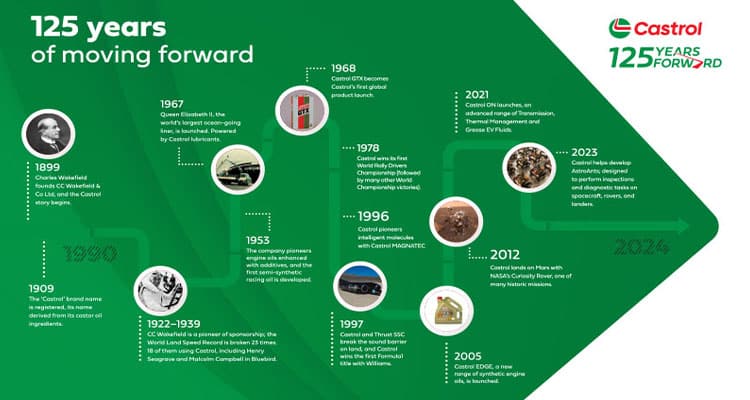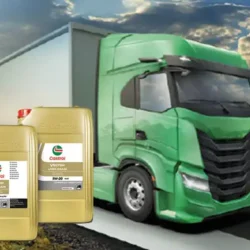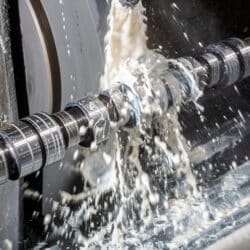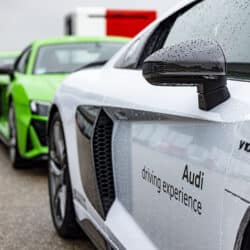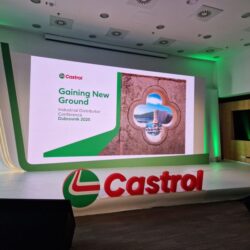The History of Castrol
Introduction
2024 signifies an astonishing milestone year in the history of Castrol as it celebrates its 125th anniversary. On the 9th March 1899, CC Wakefield & Co was founded by Sir Charles “Cheers” Wakefield in London.
With this year being such a poignant year, we thought we would take a little trip down memory lane and look back at where it all started, how Castrol came about, and how a small London oil company became one of the world’s most recognised and trusted brands.
So, without further ado, let’s get started…
Prologue
The history of Castrol begins on 9th March 1899, Charles ‘Cheers’ Wakefield set up an oil company in London, England. Ten years later, he produced a pioneering new lubricant that he called Castrol. Little did he know that this new lubricant would revolutionise transport for the next 125+ years.
Castrol oil has become synonymous with performance, boasting an impressive list of world speed and endurance records. It is also synonymous with motor sports, with exposure across almost all arenas of powered sport. From Malcolm Campbell’s land and water speed records, Captain Alcock’s non-stop Atlantic flight, right through to today and the Mars Rover, Castrol has remained at the cutting edge of technology. With unparalleled quality and exceptional performance, Castrol oils remain the number one choice for performance motoring.
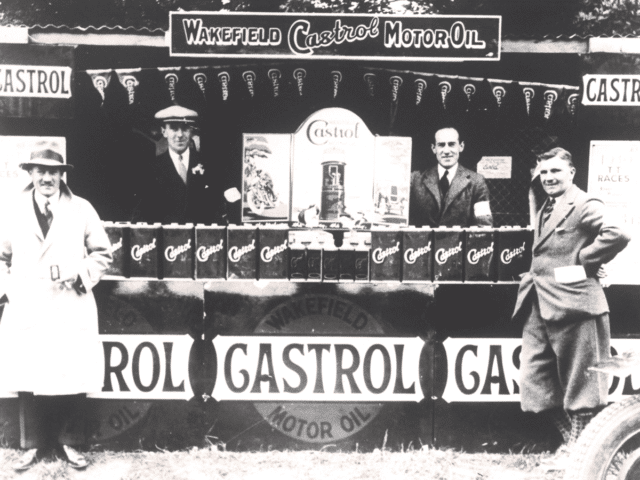
C.C. Wakefield & Co – the history of Castrol Oil and Charles ‘Cheers’ Wakefield
The Birth of C.C. Wakefield Oil
It was 1899 when businessman Charles Wakefield packed up his desk in his role as General Manager for the American Company Vacuum Oils and walked out. Now nearly 40, an eager man with a thirst to succeed and a wealth of knowledge, Wakefield decided the time had come to branch out by himself. Along with eight of his trusted employees, he set up C.C. Wakefield and Company at 27 Cannon Street, London. They produced a lubricant oil simply named Wakefield Oil, which was intended for use on rail and large machinery applications.
New Interests & The Birth of “Castrol”
By the start of the 1900s, the development of motorised vehicles was in full flow. Ever faster new models and designs were being churned out at an ever-increasing rate. The rapidly developing engineering piqued Wakefield’s interest, and he began to take a special interest in the automobile and the aeroplane. Charles saw the potential in an infinitely growing market and turned his attention away from industrial applications and onto developing lubricants specifically for these new engines.
At the time, these engines presented 2 problems. Firstly, in a resting state, the lubricants needed to be thin enough that they would work from a cold start. Secondly, they needed to continue to operate at high temperatures.
Wakefield’s researchers stumbled upon the solution. They discovered that both of these properties could be achieved by simply adding a measure of castor oil to his Wakefield oil. The result… that’s it – “Castrol”, a name derived from the contraction of the words Castor Oil.
For the Love of Sport
With Wakefield’s pioneering breakthrough, his business took off, and he quickly turned his focus from machinery to these new forms of transport. His love affair with motor cars and aeroplanes, coupled with his new product,s led Charles to another pioneering idea in the form of sponsorship.
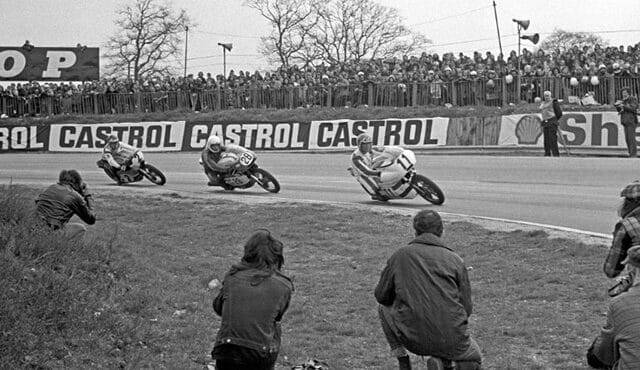
Castrol Racing Sponsorship Historical Photo
Banners could be seen at auto races and aviation events, as well as attempts to beat the land speed and water records. Wakefield could see the value potential behind being associated with winning engines and prestigious sporting events. When a Castrol-sponsored racer won or broke a record, advertisements would herald the victory, shouting to the public that the winner had ‘done it with Castrol’. During the 1920s and 30’s, the land speed record was broken no less than 23 times, with 18 of these having Castrol oil in the engine.

The Castrol Legacy
By 1960 the brand name eclipsed the founder’s name, with the oil widely recognised as Castrol. As a result, C.C. Wakefield and Company was officially changed to Castrol Ltd. In 1966, Castrol was acquired by Burmah Oil, becoming Burmah-Castrol. It remained Burmah-Castrol until 2000, when Burmah-Castrol merged into BP with Castrol remaining the Brand. The company remains at the cutting edge of lubricant technology, opening a state-of-the-art research facility in Bracknell and developing the product line to include oils specifically for car manufacturers’ individual engines.
Castrol – A Modern, Cutting Edge Brand
Following on from the history of Castrol and its illustrious heritage, today Castrol remains at the forefront of lubrication technology, leading the way in innovation and development. With technology moving at such a rapid pace, lubricants must keep up with the ever-changing challenges. The past decade alone has seen traffic congestion dramatically increase, a trend that is likely to continue. The result? Your average engine can now stop and start by as much as 18,000 times each year. This can be damaging as lubrication drains from the components whilst resting, leaving them vulnerable. This presents a new set of challenges for drivers in looking after their engines.
As well as this, the performance of vehicles is improving, requiring lubricants to work under higher stresses. And, the latest challenge, electric vehicles. These vehicles require a different set of properties. They of course, need lubricants to have electric-friendly credentials, but also these vehicles operate at higher speed potentials and so require oils which work at extreme speeds and temperatures. All these need to be developed against an environmental backdrop and regulations striving towards ‘cleaner’ automotive oils.
As different vehicles have different needs and requirements, Castrol has developed its range to be simple to understand but effective. Developing premium quality oils which guarantee to look after your engine, allowing it to run more efficiently, avoid premature wear, maintain performance, and prolong its life.

Advanced Lubricating Technology
Castrol Edge – delivers high performance whilst reducing emissions. More power – same fuel.
Castrol Magnatec – features a DUALOCK technology and is specifically engineered for today’s urban driving environment. Magnatec works to provide 50% better protection against the wear caused by restarting in busy traffic.
Castrol GTX – Castrol GTX helps extend engine life by tackling the main causes of sludge. Its advanced 3X-Clean formula surrounds and suspends dirt particles to keep engines cleaner for longer*. Giving you and your vehicle more miles together.
Castrol ON – a family of products specifically engineered to meet the gruelling demands of electric cars.

Much More Than Just An Engine Oil
But Castrol’s legacy is far more than just looking after our cars. It’s even far more than looking after the automotive sector. Without many of us even realising it, Castrol touches almost every part of our lives. Lubricants quite literally make the world go round. Without it, we would see manufacturing, food production, aerospace, and power, in fact, almost every facet of modern life come to a grinding halt. Ensuring everything keeps moving is what motivates Castrol to always be at the forefront, pushing the boundaries of innovation to developing new technologies. As the world develops, so too must the fluid technology and solutions in order to keep pace.
The History of Castrol – Further Information
To read more about how Castrol came to be and the founder Charles Wakefield, please visit our blog on ‘Charles Wakefield – The Man Behind The Castrol Brand’
To watch our short video highlighting the key milestones achieved by Castrol over its illustrious 125-year history below:

April 30, 2024
